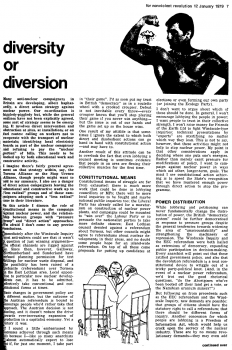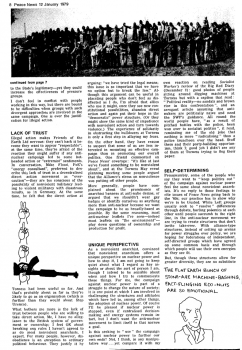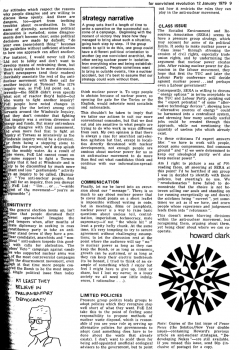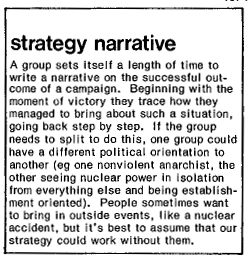 Many anti-nuclear campaigners in Britain are developing, albeit haphazardly, a direct action strategy against nuclear power. Our co-ordination is higgledy-piggledy but, while the general outlines have not been explicitly agreed, some sort of strategy seems to be emerging. It involves direct intervention and obstruction at sites, at installations or on fuel routes: calling on workers not to cooperate with the transport of nuclear materials; identifying local electricity boards as part of the nuclear conspiracy and refusing to pay the “nuclear portion” of bills. This needs to be backed up by both educational work and constructive activity.
Many anti-nuclear campaigners in Britain are developing, albeit haphazardly, a direct action strategy against nuclear power. Our co-ordination is higgledy-piggledy but, while the general outlines have not been explicitly agreed, some sort of strategy seems to be emerging. It involves direct intervention and obstruction at sites, at installations or on fuel routes: calling on workers not to cooperate with the transport of nuclear materials; identifying local electricity boards as part of the nuclear conspiracy and refusing to pay the “nuclear portion” of bills. This needs to be backed up by both educational work and constructive activity.
I imagine there’s fairly general agreement on that strategy within, say, the Torness Alliance or the Stop Urenco Alliance, though people might want to add to my summary. I also see a danger of direct action campaigners leaving the educational and constructive work to “less radical” groups and of those campaigners adopting such a “less radical” tone in their literature.
In this article I discuss the role of constitutional means in the campaign against nuclear power, and the relationship between groups with “pressure group” and “direct action” approaches. I’m afraid I don’t come to any precise conclusions. Immediately after the Windscale Inquiry most anti-nukers could see that it wasn’t question of just winning arguments – official channels are rigged against this. Since then, however, Galloway, Northumberland and Sunderland have refused planning permission for test drillings for nuclear waste disposal, and the possibility has been raised of a plebiscite (referendum) over Torness in the East Lothian area. Local opposition to particular new nuclear developments can, it has to be admitted, effectively take conventional and constitutional forms at times.
Basic changes in government policy are a different matter, but the outcome of the Austrian referendum is bound to encourage people who’d rather take that approach. The Austrian decision is not binding and it doesn’t reduce the drive towards ever-increasing expansion of production in a capitalist economy. Yet a victory it was.
If I sound a little embarrassed by successes achieved through such means it’s because I – like so many anarchists – almost automatically expect to lose in “their game”. I’d as soon put my trust in British “democracy” as in a roulette wheel with a crooked croupier. Defeat is not inevitable every throw – every croupier knows that you’ll stop playing their game if you never win anything – but the issue is out of our hands and the game set up so the house wins.
One result of my attitude is that sometimes I ignore the extent lto which both direct and disobedient actions can go hand in hand with constitutional action – and may have to.
Another result of this attitude can be to overlook the fact that even lobbying a council meeting is sometimes evidence that people in an area are flexing their collective muscles for the first time. Constitutional means
Constitutional means
Constitutional means of struggle are far from exhausted: there is much more work that could be done in lobbying councillors or MPs; there will be more local inquiries to be fought and maybe national public inquiries too; the Liberal Party has already called for a moratorium on construction of nuclear power plants, and campaigns could be mounted to “win over” the Labour Party or to persuade the nationalist parties to take more definite stances; East Lothian council decided against a referendum about Torness, but other councils might agree to referendums about nuclear developments in their areas, and no doubt some people hope for an island-wide referendum. On top of all these come proposals for putting up candidates at elections or even forming our own party (or joining the Ecology Party).
I don’t want to argue about which of these should be done. In general, I won’t encourage lobbying the people in power: I want people to trust in their collective strength. I won’t raise money for Friends of the Earth Ltd to fight Wmdscale-type inquiries: technical presentations by “experts” are mystifying no matter which way they lean. This is not to say, however, that these activities might not help to stop nuclear power. My point is that other considerations apply in deciding where one puts one’s energies. Rather than merely exert pressure for modifications of policy, I want to campaign against nuclear power in ways which aid other, longer-term, goals. The most I see constitutional action achieving is to speed the State’s recognition that we have mustered enough power through direct action to stop the programme.
Power distribution
While lobbying and petitioning can never fundamentally change the distribution of power, the British “democratic system” could be further democratised in response to pressure groups despite the general tendencies towards widening the area of “unaccountability” and strengthening the machinery of repression. The Windscale Inquiry and the EEC referendum were both hailed as extensions of democracy, expanding public participation in decision-making. Every anarchist will point out that these ratified government policy, and also that the devolution referendum is a neat constitutional device to wriggle out of a tricky party-political knot. (And, in the event of a nuclear power referendum, we’d trot out the good rhetorical questions, “do the Aborigines who’ve been booted off their land get a vote, or the Namibian uranium miners?”)
But following on from precedents such as the EEC referendum and the Windscale Inquiry, new demands are possible: that groups of citizens should have the statutory right to call a referendum; that there should be different forms of inquiry. Another concession for which people are lobbying is a Freedom of Information Act, which would help us crack open the secrecy of the nuclear industry. These are by no means revolutionary demands – they may even add to the State’s legitimacy—yet they could increase the effectiveness of pressure groups.
I don’t feel in conflict with people working in this way, but there are bound to be difficulties when groups with such divergent approaches are involved in the same campaign. One is over the justification for illegal action. Lack of trust
Lack of trust
Illegal action makes Friends of the Earth Ltd nervous. They can’t back it because they want to appear “respectable”; at the same time, they’re afraid of the reaction they might suffer if any anti-nuclear campaign led to some hot-headed action or “extremist” sentiments. In conversation, Mike Flood, FoE’s “energy consultant”, preferred to describe this lack of trust in a decentralised direct action movement as “over-caution” – they are too conscious of the possibility of nonviolent militancy leading to violent militancy with disastrous results, as in Germany. At the same time, he felt that the direct action at Torness had heen useful so far. And that’s probably about as far as they’re likely to go as an organisation (which is further than they would about Stop Urenco).
What bothers me more is the lack of trust between people who are willing to take direct action. Me, I have no allegiance to the British system of government or ownership; I feet OK about breaking any rules I haven’t agreed to as do most nonviolent anarchists, I expect. For many people, however, disobedience is an exception to ordinary political behaviour. They justify it by arguing, “we have tried the legal means: this issue is so important that we have no option but to break the law.” Althoughh this argument can be useful in placating people who don’t feel as disaffected as I do, I’m afraid that allies who use it might, once they see new constitutional possibilities, abandon direct action and again put their hope in the “democratic” power structure. (Or they might, show the same kind of impatience with nonviolent action and turn towards violence. The experience of solidarity in obstructing the bulldozers at Torness is only a first step in allaying my fears.
On the other hand, they have reason to suspect that some of us are less interested in mounting an effective campaign than in promoting our overall politics. One friend commented on Peace News’ coverage: “it’s like at last we’ve found something to be nonviolent about”, and at the Torness May event planning meeting some people argued that the Alliance’s stress on nonviolence was putting off other people. More generally, people have complained about the prominence of anarchist banners at anti-nuke demos, or argued that we shouldn’t wear gay badges or identify ourselves as anything more than anti-nuclear because we want the campaign to be as broadly-based as possible. By the same reasoning, most anti-nuclear leaflets I’ve seen – indeed most leaflets on “the environment – play down questions of ownership and production for profit.
Unique perspective
As a nonviolent anarchist, convinced that nonviolent anarchism offers a unique perspective on nuclear power and how to stop it, I am not going to keep quiet about what I regard as key insights or about the sort of person I am, though I intend to be sensible about when and how I try to communicate these things. For me, the campaign against nuclear power is part of a struggle to change the nature of society. It is one point at which I am involved in challenging the structures and attitudes which have led to, among other things, the adoption of nuclear power. Of course I’ll be pleased if nuclear power is stopped, even if centralised decision-making and energy systems remain intact, but I don’t want the anti-nuclear movement to limit itself to that narrow a goal.
Is this seeking to “use” the campaign against nuclear power to further our own ends? Not, I think, in any manipulative way. Yet compare it with my own reaction to reading Socialist Worker’s review of the Big Red Diary (December 9): good photos of people sitting around digging machines at Torness but with a caption that read: “Political reality – no sandals and brown rice in this confrontation”, and an arrogant article assuming that anti-nukers are politically naive and need the SWP’s guidance. All round the world people have, “as a result of pitched battles with the police, been won over to socialist politics”, it read, reminding me of the old joke that nothing is more “radicalising” than a police truncheon over the head. Stuff them and their party-building opportunism, think I; good job I didn’t see any of them at Torness trying to flog their paper.
Self-determining
Presumably, some of the people say they want to “keep politics out” of the campaign against nuclear power feel the same about nonviolent anarchism. It’s no reply to those feelings to cite issues of Peace News going back to the ’60s; our practice has to show why we’re to be trusted. While Left groups usually seek to “resolve” differences through debate, hurling polemics at each other some people succumb to the right line, in the anti-nuclear movement we are trying to create structures that don’t invite take-over. With alliance-type structures, instead of setting up arenas for power struggle over policy, we are hoping for federations of independent, self-directed groups which have agreed on some common basis and through which people will use their own energies as they see fit.
But, though these structures allow for greater diversity, they are no substitute for attitudes which respect the reasons why people disagree and are willing to discuss these openly. And there are dangers, too – apart from teething troubles about coordination. In the name of diversity, sometimes political discussion is curtailed; some disagreements don’t become clear, some political decisions are made by default; “do your own (nonviolent) thing” becomes the guideline without sufficient attention to how one approach can affect another.
For instance, I would never tell FoE Ltd not to lobby and don’t want to develop means of restraining them, but there really needs to be more discussion. Won’t newspapers (and their readers) inevitably associate the rest of the anti-nuclear movement with their call for another inquiry at Torness? The 1974 inquiry was, as FoE Ltd point out, a ‘travesty’ – the SSEB didn’t even specify what sort of reactor they’d build – but who wants to fight another inquiry? FoE people have noted changes in attitude (for the better) among civil servants around the Windscale Inquiry, and they don’t consider that fighting that inquiry was a serious diversion of energy and funds. But many anti-nukers utterly disagree with that assessment, and even more feel that to fight an inquiry at Torness as intensively as the Windscale inquiry would be a diversion. Far from being a stepping stone to cancelling the project, we’d drop splash into the muddy water. As a result of these views, FoE Ltd cannot count on the same support to fight a Torness inquiry that it had at Windscale and is likely to be discomfited by much more militant and less “gentlemanly” activity were an inquiry to be called. (Bureaucrat: “You anti-nuclear people, first you call for an inquiry, then you disrupt it.” FoE Ltd: “ Um ... er...” – aside to rest of the movement – “you’re so irresponsible”.)
Sensitivity
As the general election looms up, isn’t it time that people discussed their different approaches? Imagine the frayed tempers when, after months of delicate diplomacy in seeking to coax a constituency party to take an anti-nuclear stand (even if they have a pro-nuclear candidate), anarchists and “non-political” anti-nukers torpedo this goodwill with calls for abstention. The “Voters’ Veto” campaign against candidates who supported nuclear arms was one of the most controversial campaigns in the disarmament movement, even though at that time more people considered the Bomb to be the most important political issue than today think nuclear power is. To urge people to abstain because of nuclear power, so opening the gate for the Tories or the English, would infuriate most socialists and nationalists.
This shouldn’t be taken to imply that we tailor our actions to suit our more conventional comrades, but that we find out and are sensitive to what people are trying to do who work in ways different from ours. My own opinion is that there is always a case for anarchist anti-election agitation but that, except in localities directly threatened with nuclear developments, not enough people are anxious about nuclear power for us as an anti-nuclear movement to do more than find out what candidates think and continue with our information-spreading.
Communication
Finally, let me be lured into an excursion about our “message”. There is so much to say about nuclear power that to cover most points on a short leaflet is impossible without writing in code but in meetings, films or pamphlets, nuclear power is a way to raise basic questions about useless toil, centralisation, imperialism, technocracy, male supremacy – if not “the whole bit” at least a pretty hefty chunk. At the same time, it’s very tempting to try to secure agreement without challenging assumptions; to let the discussion rest at the point where the audience will say “no” to nuclear power as long as they can keep the Bomb, or as long as economic, growth can be sustained, or as long as they can keep their electric toothbrush (to be honest, I tried to think of an example of something which I enjoy but feel I might have to give up, limit or share, but I lost my nervy; in a lousy society we all need our little indulgences. I rationalise…)
Limited policies
Pressure group politics leads groups to adopt policies which they recognise stop well short of what they want. FoE Ltd take this to the point of feeling some responsibility to propose methods of nuclear waste disposal, which is reasonable if you see your role as serving up alternative policies for governments to adopt (and something does have to be done about the waste that already exists). I don’t want to scold them for being self-appointed unofficial ecological advisors to the government, but to point out how it restricts the roles they can play in the anti-nuclear movement.
Class issue
The Socialist Environment and Resources Association (SERA) seems to have a pressure group strategy, which may account for some of its political limits. It seeks to make nuclear power a “class issue” through stressing the erosion of civil rights, especially trade union rights, and by undermining the argument that nuclear power creates jobs. After raising nuclear power for discussion in the labour movement, they hope that first the TUC and later the Labour Party conference will decide against nuclear power… and perhaps even a Labour government?
Consequently, SERA is willing to discuss “energy options” in terms acceptable to the TUC and Labour Party, pointing out the “export potential” of some “alternative technology devices”, showing how “alternative sources of energy”’ could be harnessed into a centralised system, and stressing hos many socially useful jobs could be created through this approach, while not mentioning the quantity of useless jobs which already exist.
To these criticisms I’d expect answers like: “we have to work with people, accept some compromises, find common ground” and “if we were determined to keep our ideological purity we’d also keep nuclear power”.
Am I right to picture a sea of PN-reading faces, all sneering at SERA at this; point? I’d be horrified if any group I was in decided to identify with these policies, but sneering’s no use. We “revolutionaries” have failed to demonstrate that the choice is not between selling our souls and standing on (or running energetically up and down) the sidelines being “correct”, yet sometimes we act as if we have, and scorn people whose experience and judgement lead them into “reformism”.
This doesn’t mean blurring divisions within the anti-nuclear movement, but recognising them, arguing about them, yet being clear about where we can co-operate. Strategy narrative
Strategy narrative
A group sets itself a length of time to write a narrative on the successful outcome of a campaign. Beginning with the moment of victory they trace how they managed to bring about such a situation, going back step by step. If the group needs to split to do this, one group could have a different political orientation to another (eg one nonviolent anarchist, the other seeing nuclear power in isolation from everything else and being establishment oriented). People sometimes want to bring in outside events, like a nuclear accident, but it’s best to assume that our strategy could work without them.

